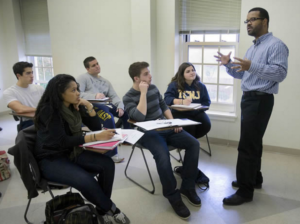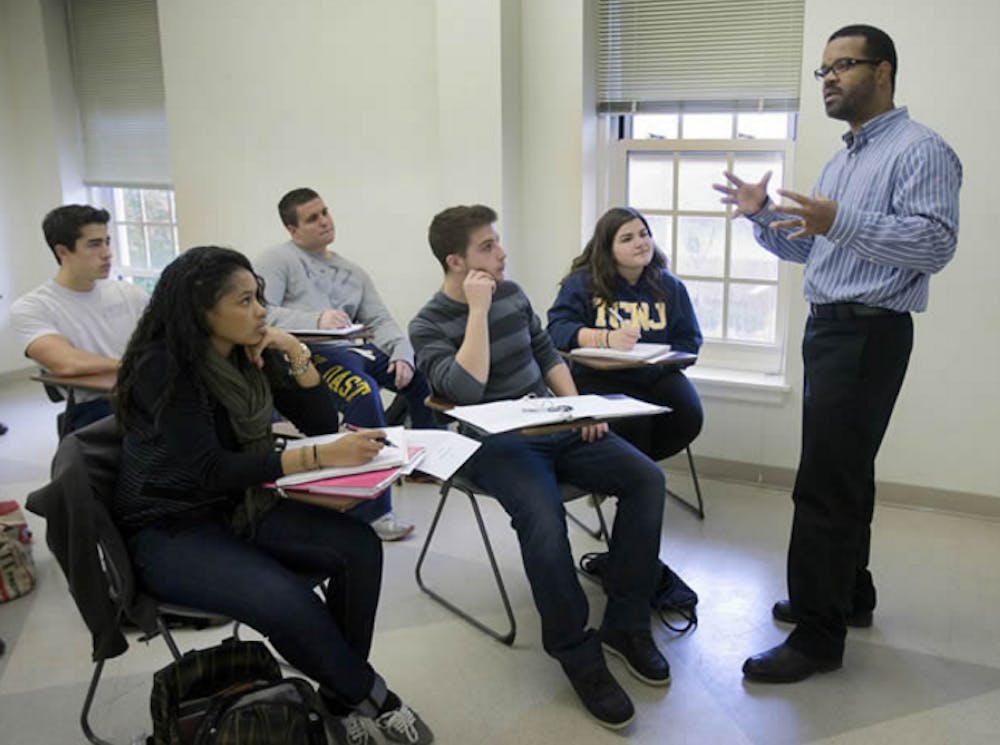By Heather Haase
Web Editor
Yes, hi, this is the professor’s pet speaking.
You know, the one who sits front and center in every class. The one who takes scrupulous notes in her thick notebook. The one who raises her hand regularly to ask and answer questions.
I am here to urge you to pay attention more in class. Before you start rolling your eyes, please let me make my case.
Let’s start with the obvious reason to be more attentive in class — your grade. There are reasons why participation grades exist. Participation grades encourage students to stay engaged during the lessons so that they are prepared for an assessment. If a class does not have a participation grade, inattention will probably be reflected somewhere else, like in poor exam scores or project feedback.
Some professors will call students who aren’t paying attention out, while others couldn’t care less. On the first day of one of my classes this semester, the professor told students that if anyone in the room prefers to do other homework or play games on their devices during the class period, they all should sit in the back row so their screen will not distract the other students sitting behind them. This request was in no way passive-aggressive. She was sincere, and some students did end up moving to the back row.
The catch is that if you play on your computer all throughout class and halfway through the semester you realize you have no idea what is going on in the course, your professor will likely be less sympathetic when you come to their office hours in distress the week before the test.
Professors don’t just notice when you are not paying attention, they also notice when you do. At the end of last semester I was 0.5 percent away from getting an A in one of my classes. I participated throughout the entire semester, engaged in class discussions and asked the professor intentional questions. The professor granted me the extra boost.
I love to learn. If I could afford to be a student for the rest of my life, I would. My inherent curiosity makes it more bearable, if not pleasurable for me to engage in all of my classes, even when the lessons are not about something that initially piques my interest.
Still, not every course is my absolute favorite. Sometimes a professor drones on about some dry concept that I believe has no relevance to my personal future, and I succumb to the temptation to check my email quickly. I may be a nerd, but I am still human.
But I do go to every class with the intention to stay focused and do what I came to college to do — learn.

I transferred to the College last fall. Though I wish to leave some of the unpleasant experiences from my previous college behind, I will always remember a statement one of the professors at my last institution made during my freshman seminar: “Students are the only consumers that want less for what they pay for.”
Whether you or someone else is paying for your tuition, college is still a consumer product. It costs money to take a collection of classes so you can accumulate knowledge and build skills that are in turn marketable in the workplace. If you are not paying attention in class, you are not receiving the whole product. It’s like paying for a gym membership and then never going, except college is a lot more expensive.
If I cannot persuade you using an academic or economic approach, let’s try a social angle. You are in the classroom anyway. You made the decision to get out of bed to sit at an uncomfortable desk. You are going to have to complete the homework, prepare the project, or take the test at some point. If you pay attention in class, that is less time spent studying in your free time. Instead of googling the topic the professor talked about or copying down your friend’s notes after class, you can take that time to relax and actually hang out with the friends you are texting throughout the lecture.
I recognize it is hard in the digital age for students to stay focused. There is a plethora of stimuli that seem to demand your attention over the professor’s lecture. With a discreet click of a button, you can catch up with a friend from home, play a favorite video game or watch countless videos of any cute animal you please.
I also understand there are extenuating circumstances. I know there are students in my classes with learning differences. I know there are students who work long hours to pay for college and therefore have difficulty finding the time to get all of their homework done. And I cannot know if the student who is vehemently typing away on their messenger app is actually communicating with family about a sick relative or another emergency. But I have accidentally eavesdropped on enough of my peers to know that usually is not the case.
Take a break from Facebook, friends. It will still be there when you get out of class.







